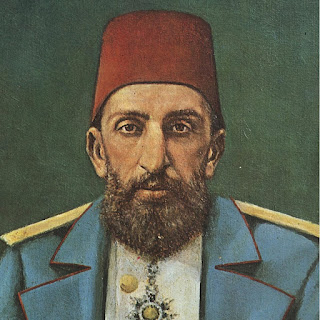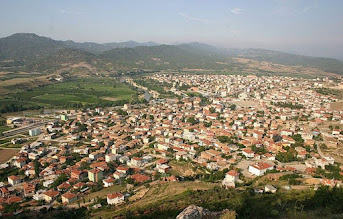Wednesday, 28 December 2022
SULTAN ABDUL HAMID II
ERTUGRUL GHAZI
Ertugrul's life was filled with challenges and obstacles. He faced constant threats from rival tribes and enemies who sought to harm his family and tribe. Despite these challenges, Ertugrul remained determined and always found a way to overcome them.
One of the main conflicts in Ertugrul's life was with the Byzantine Empire, which sought to dominate the Turkish tribes. Ertugrul and his tribe were allied with the Seljuk Turks, who were also fighting against the Byzantines.
Ertugrul's alliance with the Seljuks proved to be beneficial, as he was able to gain their support and resources in his fight against the Byzantines. With the help of the Seljuks, Ertugrul was able to establish his own principality and expand his territory.
Ertugrul's personal life was also filled with challenges and conflicts. He was married to Halime Hatun, with whom he had four children: Gündüz, Savci, and Osman.
Ertugrul's marriage to Halime was not always smooth, as they often clashed due to their different personalities and beliefs. However, they eventually learned to respect and understand each other, and their relationship became stronger as a result.
Throughout his life, Ertugrul faced numerous challenges and enemies, but he always found a way to overcome them. He was a skilled warrior and strategist, and he used these skills to protect his family and tribe.
Ertugrul Bey was also known for his fairness and justice, and he was respected by his followers. He was a strong and decisive leader, but he was also known for his kindness and compassion.
In 1230, Ertugrul Bey and his followers settled in the region of Söğüt, which was under the control of the Seljuk Sultanate of Rum. The Kayi tribe, under Ertugrul Bey's leadership, began to establish itself in the region and gain power. Ertugrul Bey eventually became a bey or chieftain, and his tribe became known as the "Beylic of Ertugrul."
ERTUGRUL GHAZI TOMB
Ertugrul Bey died in 1281 at the age of 70 he was been buried in sogut. after His death, his Son Osman became the chief of his tribe. The exact date and circumstances of his death are not known.
Ertugrul Bey's legacy lives on today through his descendants, who had continued to build and expand the Ottoman Empire. He is remembered as a great warrior, leader, and statesman, and his life continues to inspire people around the world.
Tuesday, 27 December 2022
SULTAN OSMAN GHAZI
SULTAN OSMAN GHAZI
Usman Ghazi, also known as Osman I, was the founder and first sultan of the Ottoman Empire, a powerful state that emerged in the late 13th century in Anatolia (present-day Turkey) and went on to become a major power in the Middle East, Eastern Europe, and North Africa. He was born in 1258 likely in the city of Söğüt in western Anatolia.
Osman's early life is shrouded in mystery, as few contemporary sources provide detailed information about his childhood and youth. It is known that he was a member of the Kayi tribe, a small Oghuz Turkic group that had migrated to Anatolia in the 11th century. He was the son of Ertugrul Bey, the leader of the Kayi tribe, and the grandson of Suleyman Shah.
Osman was married at least once, and possibly more than once. His first wife was Malhun Hatun, the daughter of a prominent tribal leader. with whom he had one child, Orhan who was become the second sultan of the Ottoman Empire. It is possible that Osman had other wives and children as well, but little is known about these relationships.
Osman's rise to power began in the early 13th century when he became the leader of the Kayi tribe following his father's death. He inherited a small domain in western Anatolia, which he quickly began to expand through a series of military campaigns against neighboring Turkish and Byzantine states. He was aided in these efforts by the skilled warrior TURGUT Alp, who served as his chief advisor and played a key role in helping Osman establish his rule.
As Osman's power grew, so did his reputation as a skilled
military leader and a visionary ruler. He was known for his bold and decisive
actions, as well as his ability to inspire loyalty among his followers. He also
demonstrated a keen sense of strategy and an ability to adapt to changing
circumstances, which helped him to emerge as a dominant force in Anatolia.
Osman also worked to strengthen and consolidate his rule by establishing a bureaucracy and implementing a series of administrative and legal reforms. He created a system of tax collection and established a code of laws that applied to all of his subjects, regardless of their religion or ethnicity. These reforms helped to create a more centralized and efficient state, and they laid the foundations for the Ottoman Empire's later success.
In addition to his military and administrative
accomplishments, Osman is also remembered for his role in spreading Islam in
the region. He was a devout Muslim, and he worked to promote religion among
his subjects and in the territories he conquered. He also supported the
construction of mosques, madrasas (Islamic schools), and other institutions
that helped to spread Islam and improve the lives of the people he ruled.
SULTAN OSMAN GHAZI TOMB
Osman's rule came to an end in 1326, when he died at the age of 68. He was succeeded by his son, Orhan, who continued the expansion of the Ottoman state and established the Ottoman Empire as a major power in the region. Osman's legacy lived on, however, and he is remembered today as one of the most important figures in Turkish history.
QUAID-E-AZAM MUHAMMAD ALI JINNAH
Unfortunately, Jinnah's efforts death in 1948,at the age of 71 just over a year after Pakistan's independence. Despite his brief tenure as Pakistan's leader, Jinnah's legacy continues to be felt in the nation he helped to create, and he is remembered as one of the most influential figures in the history of Pakistan.
Monday, 26 December 2022
SULTAN ORHAN GHAZI
ORHAN GHAZI
Orhan Ghazi was the second sultan of the Ottoman Empire, which was a major power in the Middle East and Europe for more than 600 years. He was the son of Osman I, the empire's founder and first sultan. Orhan was born in 1281 in the Turkish town of Söğüt, located in the region of Bithynia, which is now part of modern-day Turkey.
One of Orhan Ghazi's most significant accomplishments was the capture of the city of Bursa in 1326, which became the Ottoman Empire's first capital. This victory solidified Orhan Ghazi's position as the leader of the Ottoman Turks and allowed him to expand his territory further.
In addition to his military successes, Orhan Ghazi was also known for his religious and cultural contributions. He supported the spread of Islam in the Ottoman Empire and built several mosques and madrasas (Islamic schools). He also encouraged cultural exchange and welcomed scholars and intellectuals from a variety of backgrounds to his court.
Orhan Ghazi's rule was marked by a period of relative peace and prosperity, and he is credited with implementing several significant reforms. He established a centralized system of government, which included a bureaucratic structure and a legal code based on Islamic law. He also encouraged trade and economic development, which helped to strengthen the Ottoman Empire.
Orhan Ghazi's reign came to an end in 1360, when he passed away at the age of 75. He was succeeded by his son, Murad I, who continued to expand the Ottoman Empire and build upon the foundations laid by his father.
SULTAN ORHAN GHAZI TOMBOverall, Sultan Orhan Ghazi was an important figure in the history of the Ottoman Empire. His military victories and reforms helped to establish the Ottoman Turks as a powerful force in the region, and his cultural and religious contributions had a lasting impact on the empire.
How much water is necessary to drink daily for health?
, the exact amount of water that a person needs can vary depending on a variety of factors, including their age, gender, body weight, activity level, and the climate they live in.
One way to determine your daily water needs is to use the following formula:
- Take your weight in pounds and divide it by 2.2 to convert it to kilograms.
- Multiply your weight in kilograms by 0.67 to determine your daily water intake in ounces.
- Divide that number by 8 to convert it to cups.
For example, if you weigh 140 pounds (63.5 kilograms), your daily water intake would be about 8.6 cups (68 ounces).
It's important to note that this formula is only a rough estimate and may not be accurate for everyone. Some people may need more or less water depending on their individual circumstances.
There are also several other factors that can affect how much water a person needs to drink, including:
Exercise: If you engage in physical activity, you will need to drink more water to compensate for the fluids lost through sweat.
Illness: If you are sick with a fever, vomiting, or diarrhea, you may need to drink more water to replace the fluids lost through these conditions.

- Altitude: At higher altitudes, the air is drier and you may need to drink more water to stay hydrated.
It's important to pay attention to your body's thirst
signals and drink water when you feel thirsty. This can help ensure that you
are adequately hydrated. You can also check the color of your urine to
determine if you are drinking enough water. If your urine is pale yellow or
clear, you are probably well-hydrated. If it is dark yellow or amber, you may
be dehydrated and should drink more water.
There are also many other benefits to drinking water, including:
Regulating body temperature: Water helps to regulate your body temperature, which is especially important during exercise or in hot weather.
Lubricating joints: Water helps to lubricate your joints, which can help to reduce the risk of joint pain and stiffness.
Aiding in digestion: Water helps to break down food and move it through your digestive system, which can help to prevent constipation.
- Enhancing skin health: Drinking water can help to keep your skin hydrated and healthy, which can help to reduce the risk of acne and other skin problems.
In summary, it is important to drink enough water to stay
hydrated and maintain good health. The exact amount of water you need may vary
depending on your individual circumstances, but a general guideline is to drink
at least 8 cups (64 ounces) of water per day.
Some of the best benefits of Morning walks
Morning walks have numerous benefits that can improve your overall health and well-being. Here are some of the best benefits of taking a morning walk:
1. Improved
cardiovascular health: Walking is a great form of aerobic exercise that can
help improve your heart health. It can lower your blood pressure, reduce your
risk of heart disease, and improve your cholesterol levels.
3. Weight
management: Walking can help you maintain a healthy weight or even lose weight
if you're trying to shed a few pounds. It's a low-impact form of exercise that
can help you burn calories and boost your metabolism.
4. Stress
management: Walking can help reduce stress and improve your mood. The fresh air
and natural surroundings of a morning walk can provide a sense of calm and
relaxation.
5. Improved
mental clarity: Walking can help improve your cognitive function and increase
your creativity and problem-solving skills. It can also help you clear your
mind and improve your focus and concentration.
6. Better
bone health: Walking can help improve your bone density and reduce your risk of
osteoporosis. It's a weight-bearing exercise that can help strengthen your
bones and improve your overall bone health.
7. Increased
energy levels: Walking can help boost your energy levels and increase your
physical endurance. It can help you feel more alert and awake, and it can even
improve your athletic performance if you're an athlete.
8. Improved
immune system: Walking can help boost your immune system and reduce your risk
of getting sick. The fresh air and natural light of a morning walk can help
improve your overall health and well-being.
9. Enhanced social connections: Walking can be a great way to connect with others and build social Connections. It can be a great opportunity to catch up with friends or meet new people in your Community.
10. Improved overall health: The benefits of Walking are numerous and can improve your overall health in many ways. From improving your Cardiovascular health to reducing stress and Boosting your immune system, the benefits of a Morning walk are endless.
So if you're looking to improve your overall health And well-being, consider adding a morning walk to Your daily routine. The benefits are numerous and Can help you feel better physically, mentally, and Emotionally. So, it is a good habit to start your day With a morning walk.
Thursday, 15 December 2022
An important reason for the rapid spread of cancer discovered
Cancer is considered to be the second leading cause of death in the world and a major reason for its rapid spread has been identified.
Obesity is spreading
like an epidemic around the world and as a result, people are at increased risk
of cancer.
This was revealed in a
new medical study conducted in the United States, which explained the
relationship between obesity and the risk of cancer.
The Boston Children's
Hospital study focused on breast cancer, and the researchers provided evidence
that obesity can disrupt the blood supply to mammary tumors, allowing them to
grow.
The researchers said
that when a tumor receives blood, its growth accelerates.
In this study,
experiments were carried out on mice and the researchers had the opportunity to
observe the growth of the tumor in real time.
Then, during
experiments in the laboratory, the researchers discovered that the fat cells in
the obese mice produced higher amounts of compounds that activated the tumors
by pulling them out of a dormant state.
The results of this
research were published in the journal Proceedings of the National Academy of
Sciences.
A study published in
August in the journal The Lancet found that deaths from easily preventable
types of cancer are rising worldwide.
Research has found
that smoking, alcohol consumption, or being overweight are the 3 biggest risk
factors for cancer.
The researchers said
that the results show that the majority of cancer cases worldwide are
preventable, while the mortality rate can also be reduced through early
diagnosis and effective treatment.
Researchers
acknowledge that not all cancer cases or deaths can be prevented, but avoiding
smoking and alcohol, maintaining healthy body weight, avoiding excessive
exposure to sunlight, and eating a balanced diet can reduce the risk of this
deadly disease. can be reduced.
11 Things That Happens To Your Body When You Lack Vitamin C!
Vitamin C, also known as ascorbic acid, is a vital nutrient that plays an essential role in maintaining the health of our bodies. It is a ...
.jpg)
-
Cryptocurrency, also known as digital or virtual currency, is a form of decentralized digital money that utilizes advanced cryptography fo...





.jpg)





























